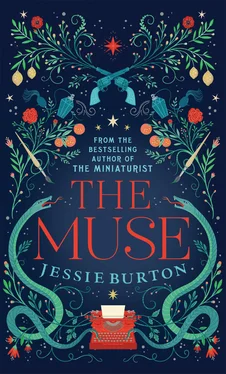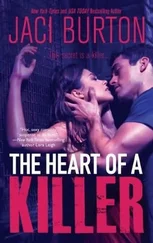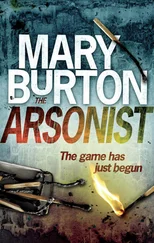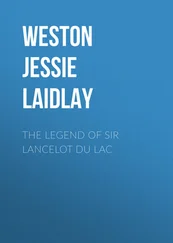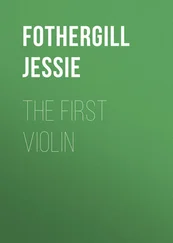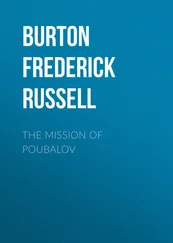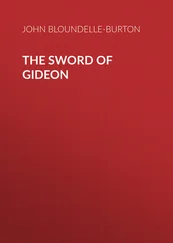Her laughter was infectious and I giggled too. It was a ludicrous thing to say, but it melted the tension inside me. ‘Some people don’t mind it,’ I said, thinking of Cynth, how I was abasing her for this exchange, this strange game whose rules I didn’t know. ‘It takes a skill.’
‘I dare say. But so many anonymous toes.’ She shuddered. ‘We have all these beautiful portraits at the Skelton, but we’re really just gangling arms, gurgling intestines. The heat inside the liver.’ She looked at me hard, and took another drag. ‘I’ve had a lot longer than you to come to that conclusion, Miss Bastien. Toes, the crooks of elbows. Enjoy dignity in them while you can.’
‘I’ll try,’ I said, unsettled once again. There was a restlessness to her; it felt as if she was putting on a performance for me, and I didn’t know why.
There was a knock on the door. Quick told them to enter and our lunch arrived on a trolley, pushed by a very small, elderly porter who only had one arm. A basket of rolls, two flat fishes, a buoyant-looking salad, a bottle of wine in a cooler, and something else hidden under a steel dome. The porter glanced at me, startled like a rabbit. His rheumy eyes slid back to Quick.
‘That’ll be all, Harris. Thank you,’ Quick said.
‘We haven’t seen you all week, miss,’ he replied.
‘Ah — annual leave.’
‘Somewhere nice?’
‘No.’ Quick looked momentarily disconcerted. ‘Just a home stay.’
The porter changed his attention to me. ‘Bit different to the last one,’ he said, cocking his head. ‘Does Mr Reede know you’ve got a wog in?’
‘That will be everything, Harris,’ said Quick, in a tight voice. He cast her a disgruntled look and left the trolley, staring at me as he backed out of the door.
‘Harris,’ Quick said when he’d gone, as if to say his name was explanation enough. ‘The arm got lost in Passchendaele. He refuses to retire and no one has the heart to do it.’ The porter’s word clung to the air. Quick stood up and handed me a plate off the trolley.
‘Just use the desk to rest it, if you don’t mind.’ She carried her own plate round to her side of the desk. She had a slim little back, her shoulder blades slightly poking through the blouse like a pair of fins. The wine had been uncorked and she poured us both a glass.
‘It’s very good. Not like the stuff we use for the public.’ The glug of it was loud and lush and transgressive, like she was pouring me elixir in full daylight. ‘Cheers,’ Quick said briskly, raising her glass. ‘I hope you like lemon sole.’
‘Yes,’ I replied. I’d never eaten it before.
‘So. What did your parents say when you told them you were working here?’
‘My parents?’
‘Were they proud?’
I wiggled my toes in the confines of their shoes. ‘My father’s dead.’
‘Oh.’
‘My mother is still in Port of Spain. I’m an only child. She might not even have got my letter yet.’
‘Ah. That must be hard for you both.’
I thought of my mother — her belief in England, a place she would never see; and I thought of my father, recruited into the RAF, gone down over Germany in a ball of flame. When I was fifteen, the Prime Minister of Tobago had declared that the future of the islands’ children lay in their schoolbags. My mother, desperate for me not to live a life like hers and Dad’s, pushed me to better myself — but for what, when all the land post-independence was being sold to foreign companies who invested the profits back into their own countries? What were we youngsters supposed to do, when we reached the bottom of those schoolbags and found nothing there — just a seam, split from the weight of our books? We had to leave.
‘Are you all right, Miss Bastien?’ said Quick.
‘I came here with my friend, Cynth,’ I said, not wishing to dwell on Port of Spain, the death board with Dad’s name on it, his empty plot in Lapeyrouse Cemetery that Mama still kept vacant, the Catholic nuns who’d taught me as I grew up in my grief. ‘Cynthia’s engaged,’ I said. ‘She’s getting married.’
‘Ah.’ Quick picked up her knife and began to lift a small segment of the sole, and I had the strange feeling of saying too much without having said anything at all. ‘When?’
‘In two weeks. I’m maid of honour.’
‘And then what?’
‘Then what?’
‘Well, you’ll be alone, won’t you? She’ll be living with her husband.’
Quick always insisted on skirting her own truths whilst getting to the core of yours. She told me nothing about the Skelton, focusing only on finding out about me, and had soon skewered my darkest fear. The fact was, Cynth’s imminent departure from our little flat had hung between me and my oldest friend like a silent question, heavy with foreboding. We both knew she would leave to live with Samuel, but I couldn’t imagine rooming with anybody else, so I didn’t talk about it, and neither did she. I boasted about my new job and she fretted over wedding invitations and made me sandwiches I overlooked. The salary from the Skelton would cover the second room she was going to vacate, and this was my only comfort.
‘I enjoy my own company,’ I said, swallowing hard. ‘It’ll be nice to have some space.’
Quick reached for another cigarette, but then seemed to change her mind. If you were alone , I thought, you’d have already smoked three more . Her eyes rested briefly on my face as she lifted the steel dome to reveal a lemon meringue. ‘Do eat something, Miss Bastien,’ she said. ‘All this food.’
Whilst I ate my slice of meringue, Quick didn’t touch a crumb. She seemed born to all this, to the smoking and the telephone orders, the tangential observations. I imagined her in her twenties, raffing round London with a glamorous set, a cat amongst the Blitz. I was piecing her together from Mitford and Waugh, dousing her with a coat of my newly discovered Muriel Spark. It was perhaps a vanity, instilled in me from the education I’d received, which was little different from the model used in English public schools, with its Latin and Greek and boys playing cricket — but I had yearned for eccentric, confident people to enhance my life; I thought I deserved them, the sort of people you found only in novels. Quick hardly had to do anything, I was so sprung for it, so willing. Starved of my past life, I began to concoct a present fantasy.
‘Your application interested me greatly,’ she said. ‘You write very well. Very well. At your university, you seem to have been one of the brightest students. I take it you think you’re too good to be a secretary.’
Fear ran through me. Did this mean she was letting me go, that I hadn’t passed the trial? ‘I’m very grateful to be here,’ I said. ‘It’s a wonderful place to work.’
She made a face at these blandishments and I wondered what it was she wanted. I reached for a bread roll and rested it in my palm. It was the weight and size of a small marsupial and I had an instinct to stroke it. Feeling her eyes upon me, I plunged my thumb into the crust instead.
‘And what sort of things do you like to write?’
I thought of the piece of paper on the typewriter in the other room. ‘Poems, mainly. I’d like to write a novel one day. I’m still waiting for a good story.’
She smiled. ‘Don’t wait too long.’ I was quite relieved she gave me this instruction, because usually whenever I told people I wanted to write, they would tell me how their own lives would make the perfect subject. ‘I mean it,’ said Quick. ‘You mustn’t hang around. You never know what’s going to pounce on you.’
‘I won’t,’ I said, gratified by her insistence.
She sat back in her chair. ‘You do remind me of someone I used to know.’
Читать дальше
